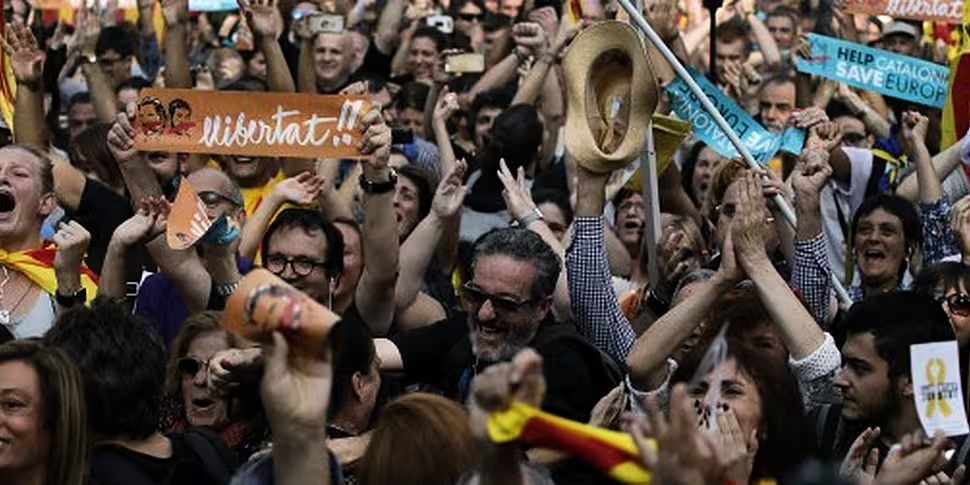Updated 19:45
The Spanish Prime Minister has moved to sack the Catalan Parliament following its vote to declare independence earlier today.
In a speech following an extraordinary meeting of the Spanish Cabinet, Mariano Rajoy said the central government in Madrid will assume the powers of the Catalonian administration until fresh elections can take place.
He said elections will be held in the region on December 21st.
He said the vote will allow Catalonians to “decide their future” and ensure "nobody can act outside the law on their behalf."
“We believe that is urgent to return the voice to the citizens of Catalonia – all of them – in democratic conditions so that they can decide the future,” he said.
“So nobody can create illegalities on their behalf.”

Spain's Prime Minister Mariano Rajoy makes a statement after a special Cabinet meeting at the Moncloa Palace in Madrid, Spain, 27-10-2017. Image: Paul White/AP/Press Association Images
He confirmed that Madrid will seek to declare this afternoon's independence vote illegal – adding that the regions chief of police will be sacked.
The Spanish Constitutional Court has suspended the declaration while judges consider legal arguments that the vote breaches the country's constitution.
Mr Rajoy has repeatedly insisted that the original October 1st referendum was illegal - as the constitution states that Spain is "indivisible."
Declaration of independence
It comes after a dramatic day in Barcelona in which the Catalan Parliament voted to declare independence from Spain.
A total of 70 members of the regional parliament voted in favour of a split, with 10 voting against and two handing in blank ballots.
The result was greeted with loud cheers in the Parliament building. Separatist demonstrators outside the parliament greeted each pro-independence vote with a cheer.
Tens of thousands of people chanted their support as they gathered nearby. Watching events from inside on two giant screens, they clapped and shouted "independence" in Catalan:

Demonstrators react as the Catalan Parliament declares independence from Spain, 27-10-2017. Image: Emilio Morenatti/AP/Press Association Images
Following the vote the the president of the Catalan parliament, Carles Puigdemont said members had followed the will of the people:
“Today our Parliament that came out of a democratic election has taken a very important step,” he said.
“The legitimate representatives of the citizens have followed the people’s mandate.”
Direct rule
Immediately after the vote, Mr Rajoy called for calm throughout the country warning that, “the rule of law will be restored in Catalonia.”
Pido tranquilidad a todos los españoles. El Estado de Derecho restaurará la legalidad en Cataluña. MR
— Mariano Rajoy Brey (@marianorajoy) October 27, 2017
Just after 3pm Irish time, the Spanish Senate granted Madrid powers to impose direct rule over the region.
There were 214 votes in favour and 47 against.
Mr Rajoy chaired an extraordinary meeting of Spanish Cabinet ministers from 6pm Irish to decide what measures to take.
He said Minsters would decide whether to approve the Spanish senate decision.
Reunido el Consejo de Ministros extraordinario para aprobar las medidas autorizadas por el @Senadoesp al amparo del artículo 155 #CMin pic.twitter.com/ZuUs53dUTc
— Mariano Rajoy Brey (@marianorajoy) October 27, 2017
Rebellion charges
Spain’s top prosecutor is set to seek rebellion charges against Mr Puigdemont and those behind the independence declaration, a spokesperson for the Public Prosecutor’s Office (Ministerio Fiscal) told the Associated Press (AP).
It will be up to a court to decide whether to accept the charges.
Under Spanish law, the charges carry a maximum prison sentence of 25 years – with shorter sentences provided the declaration of independence does not lead to violence.
The spokesperson told the AP that the prosecutor is working towards deciding whether the charges should be limited to the Catalan cabinet – or should include other members of the parliament.
It is believed the charges could be brought as early as Monday.
Article 155
Invoking the Article 155 clause in the Spanish constitution would give central government the power to take control of an autonomous region.
It would mean that Catalonia's institutions would become illegal, its government would be outlawed and Mr Puigdemont could face arrest and charges of sedition.
The law has never been invoked before.
Yesterday, Mr Puigdemont has submitted an eight-page document to the Senate, appealing to senators to reject Madrid's desire to impose more central control on the region.
European Reaction
Following the vote, the European Council President Donald Tusk said nothing had changed for the EU.
"Spain remains our only interlocutor," he said. "I hope the Spanish government favours the force of argument, not the argument of force."
Meanwhile, the European Commission declined to comment. Commission president Jean-Claude Juncker has repeatedly described the subject is an internal Spanish issue.
"We have nothing to add to what we said at [the regular] midday [briefing]," spokeswoman Mina Andreeva told the Reuters news agency.
Travel advice
The Department of Foreign affairs has warned Irish people planning to visit Spain to “be prepared to adjust your travel plans at short notice if necessary.”
.@dfatirl updates travel advice for Irish citizens in Spain. Security status remains ‘Normal’ #Cataluña #Catalonia #Catalunya pic.twitter.com/K6egZljfC5
— Jack Quann (@jqbilbao) October 27, 2017
The department noted that “there have been some incidents of violence” with travellers urged to “avoid confrontation with police or demonstrators.”
The travel advice states: “There is a possibility of further spontaneous gatherings and protests in Catalonia and elsewhere in Spain.”
“Such actions have the potential to affect local transport and other services.
“You should avoid all demonstrations, monitor local media and follow the advice of the local authorities and your tour operator.”
Reporting from Jack Quann and Michael Staines ...









